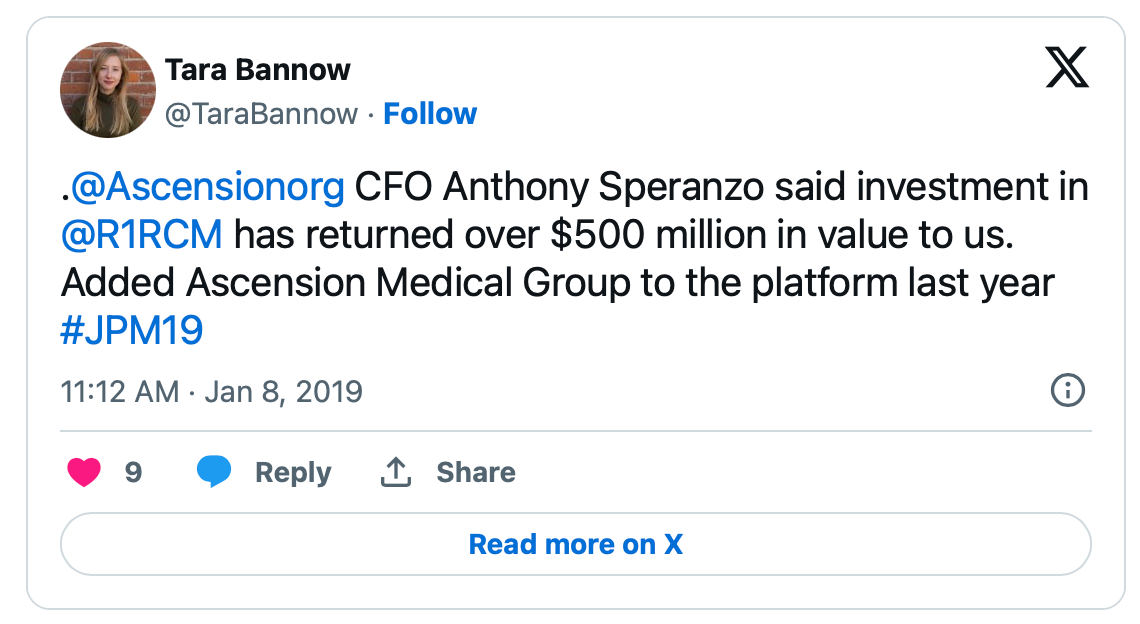

Discover more from HEALTH CARE un-covered
Ascension Health, a big chain of Catholic hospitals, claims to advocate for a compassionate and just society. But its business practices and investments tell a different story.
News recently broke that New Mountain Capital has sought to acquire outstanding shares of R1, a revenue cycle management firm, according to SEC Filings. New Mountain seeks to acquire all outstanding shares not currently owned by investors at $13.75 per share, equating to about $5.8 billion.
While the offer was made in January, R1 leadership has confirmed that it wants New Mountain Capital to “engage in good faith discussions” with TCP-ASC.
This announcement isn’t just concerning because I find some of R1’s business practices to be questionable. Take, for example, their “Propensity to Pay Algorithm.” Not unlike other revenue cycle companies, R1 uses external inputs like census, income, and poverty levels as well as internal data points like patient payment performance scores and patient interaction data to assign each patient a score.
These scores can then be used to prioritize high-propensity patients to improve cash flow, allow collections representatives to concentrate their efforts on high-yield accounts, and inform custom messaging and channels to match patients’ profiles.
The more concerning, nay, disturbing aspect of this recent announcement has to do with the PE firm (TPC-ASC) that R1 would like New Mountain Capital to “engage with” in good faith. If you need a refresher on just who TCP-ASC is and what is going on here, get ready.
Warning: You may need to take a shower after this one.
TPC-ASC is an an investment vehicle jointly owned by Ascension Health Alliance (Ascension) and TowerBrook Capital Partners LP (TowerBrook). Ascension, one of the largest Catholic hospital systems in the United States, first partnered with TowerBrook in or around 2015. Ascension and TowerBrook kicked off their formal PE strategy with an investment in a struggling and embattled debt collection company, Accretive Health.
Accretive was on its last legs and was the ongoing subject of Medicare fraud investigations, was involved in litigation regarding its debt collection practices, and had previously drawn the ire of the Minnesota attorney general for its aggressive and allegedly illegal debt collection practices. Interestingly (or disturbingly, depending on your perspective), as part of the deal Ascension agreed to make Accretive the sole billing and debt collection partner for all Ascension facilities.
Without this lifeline from Ascension and Towerbrook (together, TPC-ASC), Accretive would likely have gone under. And so, it seems, Ascension is far more comfortable coming to the rescue of financially distressed companies, but not financially distressed patients.
One of TPC-ASC’s next acquisitions is also eye-opening, but for what it says about the industry writ large, not necessarily Ascension alone. In 2016, TPC-ASC invested in an Ascension subsidiary, TriMedx. Now, a little history on TriMedx. Started in 1998 as a small department within Ascension’s St. Vincent Hospital, it eventually grew to become a massive health care technology management organization. Over the years, TriMedx created several affiliated subsidiaries, including TriMedx International, Medxcel Facilities Management, Axess Ultrasound and eProtex, the nation’s first dedicated medical device security firm.
Today, TriMedx serves more than 1,800 health care providers across 28 states, including all of Ascension’s hospitals and related facilities. So to recap, an internal department created by a non-profit hospital, with the non-profit’s assets, staff, resources, and intellectual property, to serve the hospitals’ operational and clinical needs, was essentially “spun off” to become a for-profit company? Sounds about right.
You may be asking yourself at this point, “Surely it wasn’t legal for a Catholic non-profit hospital to be able to create an internal department and then flip it to a for-profit entity to create a massive for-profit technology company?” And your instinct would be correct, except for a small wrinkle. In a 1998 ruling by the Internal Revenue Service, a pathway was created for nonprofit hospitals to profit tax-free from partnerships with for-profit companies. And who was one of the first beneficiaries of this ruling? You guessed it: Ascension.
Ascension is also very active, as are many hospitals, in venture capital. Basically, these “non-profit” hospitals conduct research or create departments to fill their systems’ needs, and then when they see profit and potential, they launch their own venture arms or use existing funds to productize and invest. Ascension Ventures was formed in 2001 by Ascension and currently has five funds and more than $1 billion in assets under management.
But fear not. We have received repeated assurances from Ascension leadership that the gains from these “aggressive investments [are solely intended to] serve the system’s mission to care for the poor and vulnerable.” Former President and CEO Anthony Tersigni has confirmed that at Ascension,“[w]e are a ministry…[w]e’re not a business.” Don’t you feel better already, knowing that everything they do is in furtherance of the system’s Catholic values and mission to care for the poor and vulnerable? Mr. Tersigni’s statement is the ultimate “no margin, no mission” bullsh%t we’ve heard time and time again. It is also worth noting that Mr. Tersigni serves both as a senior advisor to Towerbrook and as a board member at R1. The credibility abounds.
R1 finally enters the picture in 2017. Well, they were actually “in the picture” the whole time. Remember Accretive, was banned from operating in Minnesota for two years because of its practices, was the subject of a Medicare fraud lawsuit, and was delisted from the New York Stock Exchange for unresolved accounting discrepancies. Accretive changed its name to R1 in 2017 after a change in leadership and some re-branding of its image. Ascension’s investment in Accretive, I mean R1, certainly paid off. Addressing an audience at JP Morgan’s 2019 health care conference, then CFO Anthony Speranzo said investment in R1RCM has returned over $500 million in value to Ascension.
Through their investment vehicles, Ascension and TowerBrook have continued to invest in several other health care companies, including Compassus–a hospice, home health, and palliative care company in a deal valued at $1 billion–and the ambulatory surgical center company Regent Surgical Health. The investments certainly paid off for Ascension and Towerbrook, as well as their leadership. In 2019, both Tersigni and former CFO Anthony Speranzo left their clinical leadership roles to internally manage Ascension’s investments, including the establishment of a $1 billion fund based in the Cayman Islands to be used for joint investments. It was right around this time that Ascension was taking some heat for closing unprofitable business lines in vulnerable communities. The sad irony of shipping $1 billion to the Cayman Islands while simultaneously shutting down maternity wards in the District of Columbia should be a dark chapter in Ascension’s history, but the irony seemed lost on leadership.
Despite shutting down these vital services in the nation’s capital, Ascension executives still gathered to celebrate what would have been Providence’s 160th anniversary, had it actually remained a hospital. The elaborate ceremony was held at the soaring basilica of the National Shrine of the Immaculate Conception, the largest Roman Catholic Church in North America. Ascension’s mission statement was read by a priest during the ceremonies: “Rooted in the loving ministry of Jesus as healer, we commit ourselves to serving all persons with special attention to those who are poor and vulnerable,” the priest read. “We are advocates for a compassionate and just society through our actions and our words.” Such statements are especially rich considering Ascension had written policies allowing for the denial of care in non-emergency situations if a person had medical debt.
(I bet that shower sounds pretty good right about now.)
At this point, you might be asking yourself: how in the heck is this all happening without any oversight or accountability from federal regulators or lawmakers? (I used stronger language in my head). Well, according to Opensecrets.com, $1.66 million goes a long way in D.C. This figure only represents Ascension Health’s direct spending on federal lobbying in 2023, and it doesn’t include contributions made through the American Hospital Association (AHA) and other PACs at both the State and Federal levels. While the AHA does represent over 5,000 hospitals, the AHA is likely more than willing to advance Ascension’s agenda given their current CEO, Joseph Impicciche, JD, MHA, is on the AHA’s Board of Trustees. And sidenote, the AHA spent a mere $30,238,230 lobbying D.C. lawmakers and regulators in 2023.
And now we get to the 2024 headline announcement of New Capital’s potential acquisition of R1, and R1’s “encouragement of good faith discussions” with TPC-ASC. Is this all starting to make sense? New Mountain’s offer comes on the heels of several recent R1 acquisitions, including a $675 million purchase of Acclara (a business unit of Providence) and a $4.1 billion acquisition of Cloudmed (another revenue cycle management firm). News of customer terminations of R1 contracts had led to depressed stock prices for R1 of late, with share prices as low as $9.11 per share on January 11, 2024. But, news of New Capital’s cash offer of $13.75 per share caused R1’s stock price to jump 28%.
What does this all mean?
Frankly, I’m not 100% sure. But there are a few things I am sure about. First, nothing about Ascension’s business practices, investment strategies, investment assets or leadership culture aligns with its mission:
Our Catholic health ministry is dedicated to spiritually centered, holistic care which sustains and improves the health of individuals and communities. We are advocates for a compassionate and just society through our actions and our words.
Second, with UnitedHealth’s Change Healthcare cyberattack fresh on our minds, and the massive disruption that ensued (and remains ongoing) we should be keeping a watchful eye on the massive consolidation within the revenue cycle management industry. Change boasts on its website that it handles 15 billion health care transactions annually and that one in three U.S. patient records are “touched by [its] clinical connectivity solutions.” Now regulators are asking, how can disruption at one firm be so disruptive to the entire system. Of course, regulators are too late.
And my final thought. Under no circumstances should we, the American people, continue to allow entities like Ascension to claim non-profit status and rob the communities in which they exist, both literally and figuratively. This means we must hold our elected leaders accountable and force them to make the uncomfortable and inconvenient decision to do what’s right for the American people over what’s politically and financially expedient for their campaigns.
Subscribe to HEALTH CARE un-covered
Pulling back the curtains on how Big Health is hurting Americans and how we got to this point.







It's amazing how the people in charge of these corporations as well as their bought and paid for politicians always come out ahead. You would think that after the ongoing debacle at UnitedHealthcare (which they were warned would happen 2 years ago when Optum was gobbled up by UHC), the powers that be would not let these giant mergers happen. And mainstream media doesn't even report on this stuff anymore even though it affects the average person to a much larger extent than what they do report on. It's just so wrong on so many different levels.
Congratulations on the exceptional analysis, Chris Deacon! It seems that nonprofit hospitals enjoy quite a few material for-profit things: https://open.substack.com/pub/sergeiai/p/how-are-the-ceos-of-health-nonprofits.